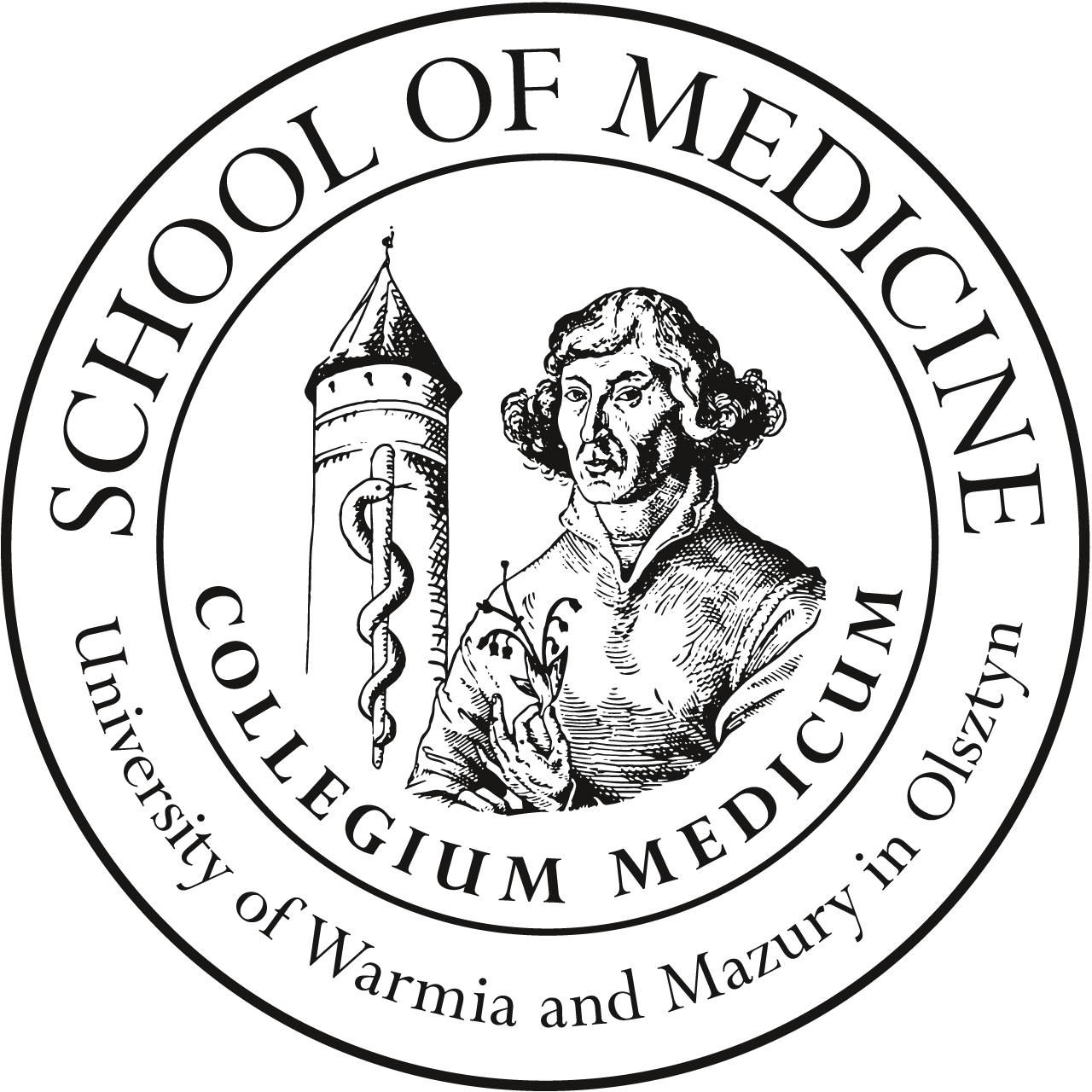REGULATIONS
University of Warmia and Mazury in Olsztyn
Collegium Medicum
Faculty of Medicine
Rules and regulations of Forensic Medicine for students of the School of Medicine Collegium Medicum University of Warmia and Mazury in Olsztyn.
1. General Information
1.1 Classes are carried out by the Department of Pathomorphology and Forensic Medicine, in the winter semester, in the didactic rooms of the University of Warmia and Mazury and, exceptionally, in other units.
The internal regulations of the Department are consistent with the Study Statute of the Collegium Medicum, School of Medicine University of Warmia and Mazury.
1.2 Employees responsible for the implementation of the subject:
a. Head of the department: Aleksandra Sejda, MD, PhD
b. Course coordinator: Piotr Paweł Engelgardt MD, PhD
c. Persons responsible for carrying out particular types of classes: employees of the Department of Pathomorphology and Forensic Medicine eg. Piotr Engelgardt, MD, PhD; Maciej Krzyżanowski MD, PhD; Marta Perkowska MD and Natalia Jamrozik MD.
1.3 The place, time and subject of individual forms of classes and credits are specified in the documents: study plan, syllabus, schedule and subject/topic list.
Teaching activity covers a variety of topics:
- Thanatology - the science of death, with particular emphasis on the post-mortem changes taking place within the human body and their usefulness for determining the time of death; determination of the pathomechanism of sudden death as a result of various external factors; death due to natural diseases
- Forensic toxicology - diagnosis of criminal, suicidal and accidental poisoning, with particular emphasis on psychoactive substances
- Basic principles of forensic genetics
- Widely understood forensic aspect of traumatology, with emphasis on road accidents
2. Didactic classes are realized in a form:
Seminars: conducted in classrooms, size: up to 25 people: discussion of the topic, multimedia presentations, discussion with students.
In the event of restrictions on social contacts (social distancing), e.g. related to a pandemic, classes are conducted online using the Microsoft Teams and/or Moodle platforms.
Exercises: conducted in classrooms, size: up to 12 people, multimedia presentations, discussion with students combined with checking students' knowledge and learning logical reasoning.
If possible, participation in a court hearing/trials, participation in the examination of living persons carried out for the needs of the administration of justice, analysis of court case files.
In the event of restrictions on social contacts (social distancing), e.g. related to a pandemic, classes are conducted online using the Microsoft Teams and/or Moodle platforms.
In exceptional situations of significant restrictions on social contacts, e.g. related to a pandemic, it is permissible to conduct online classes using the Microsoft Teams and/or Moodle platforms.
3. Principles of student participation in various forms of classes (clothes, student behavior, etc.):
- During alle classes mobile phones, pagers and any electronic devices should be switched off and taking photographs and videorecording is forbidden.
- In the didactic rooms Student is allowed to stay only in the presence of an assistant.
- It is prohibited to smoke, eat and drink in the didactic rooms and corridors.
- Student is obliged to take care for didactic equipment.
- Student is obliged to obey the work safety and fire control regulations. During the first exercise Student will be acquainted with them and must confirm it by its own signature. Student must immediately inform a tutor about all accidents occurring at the Department during the classes.
- Protective clothing during the classes will not be required.
- In the case of online classes, students are required to log in to the appropriate, previously indicated platform within the prescribed period and perform the necessary tasks within the time specified for them.
4. Attendance at classes, the way of justifying and making up for absences
4.1 Student is obliged to participate in all seminaries, and classes.
4.2 Absence should be excused. It is demanded in the case of health reasons a medical certificate of temporary disability and in other cases a certificate of proper authorities.
4.3 Acceptable number of justified absences from all forms of classes, including credits and exams – 2 items.
4.4 The way of justifying absences from all forms of classes (including credits and examinations) - in line with the procedure specifying the rules for excusing absences from didactic classes, examinations and credits at the Faculty of Medicine.
4.5 In the case of absence of exercises or seminaries - student has to attend classes with another group, and finally verbal verification of the material by the teacher is acceptable.
4.6 Procedure in the event of unexcused absence - as above.
4.7 The above rules also apply to online classes.
5. Rules for completing any classes:
5.1 Lectures: not applicable
5.2 Exercises
a. determining the method of verifying the student's preparation for the exercises - written knowledge check,
- assessment rules: each test includes a few (3-4) simple questions from a given scope of material, the condition for obtaining admission to the exercises is the correct answer to at least 50% of the questions asked.
- procedure in the event of failure to pass the material from the current exercises. Failure to pass the written test results in the necessity to make up for the exercises at a later date, after the earlier written test under the conditions as above.
b. information on the scope of the material applicable to the classes is made available at least one week before the date of the classes,
c. defining the criteria for the final evaluation of exercises on the basis of the results of individual written tests and the student's activity: the final mark is based on the average of grades from partial tests and activity during classes
5.3 Colloquiums – no applicable
5.4 Seminars:
In the case of online classes, the verification of knowledge consists in performing the indicated tasks or being active during classes, e.g. when discussing cases.
6. Exam
a. determining the conditions for taking the exam:
- full attendance
- completion of exercises (in accordance with point 5.2)
b. form of the examination: the final examination consists of 50 questions - multiple-choice test.
The exam is conducted in a traditional frorm, as an alternative- an online exam (in the case of exacerbations in social contacts resulting, for example, from a pandemic).
c. determining the scope of the material for the exam/semester examination: due to the specificity of the subject, the exam covers the issues discussed during classes, but also refers to general medical knowledge.
d. the person responsible for conducting the examination and determining the place and date of the examination: subject coordinator in consultation with the starost of the year,
e. scores and grading scale: The final examination must be passed with a score of 60% or higher to be passed. The student will be assessed as follows: 60-70% = 3, 71-76% - 3.5, 76-84% - 4, 85-92% - 4.5, 93-100% - 5.
f. information on the number of exam dates the student is entitled to take: in accordance with the regulations of studies - if the final exam fails on the first attempt, two additional deadlines are planned
g. procedure in the event of failure to pass the exam: in accordance with the regulations of studies
h. the online exam may be oral - in this case, the final grade takes into account the overall activity of the student during the classes. It is possible to conduct the exam online in the test form.
i. If an online oral exam is chosen, it is possible to delegate additional tasks to students on electronic platforms, the results of which will also affect the exam result.
j. All students take the exam in the same form, agreed in advance with the course coordinator and the starost of the year.
During final exam Student may not consult any written materials or electronic devices. Moreover, student may not have verbal or non-verbal contact with any person other than teaching assistant. Any exception of these rules will be regarded as cheating and will result in failing of the exam.
7. Defining the rules of access to individual forms of credits
Entry test for exercises - immediately after checking.
The exam - After making an initial appointment, the student in the presence of an employee of the Department (adjunct, assistant) has the right to view his / her examination work (until the examination results are entered into the USOS system and approved by the coordinator)
8. Academic rule of law and honesty:
Defining the principles of academic rule of law and integrity and the rules of conduct in the event of their violation: In the event of suspicion by the examiner or entrance test of cheating, downloading, passing on information, etc., the student receives a warning. Re-attempting unethical behavior introduces failing grade with the description of the situation.
Generally every Student has right to express all comments dealing with the course in the Department to the tutor during classes or to the Head of the Department.
9. Issues not regulated in the presented regulations for classes in the subject of Forensic Medicine at the Department of Pathomorphology and Forensic Medicine are the responsibility of the Subject Coordinator - Piotr Engelgardt, MD, PhD.
10. Classes regulations applied in Department of Pathomorphology and Forensic Medicine are consistent with the UWM Study Regulations and the procedures in force at the Faculty of Medicine.
During the first exercise, the student will read the Regulations and must confirm this with his/her own signature.
11. The student is required to read the health and safety rules at the place of classes and the EU directive of the GDPR (General Data Protection Regulation)
12. A detailed description of health and work safety regulations in force at the place where all forms of classes are carried out.
The student ought to immediately inform the assistant about all accidents or unusual events that occurred during classes.
In the case of exercises:
• Visit to the Court and participation in a court case as an audience - neat and casual clothes are advisable
• Participation in the study of living people - as in a clinical class


